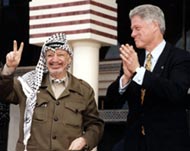Gaza’s ghost airport awaits better days
Four years after Gaza airport’s sole runway and control tower were demolished by Israeli F-16s, and days after Tel Aviv’s pullout from the territory, Palestinians are waiting for the return of the terminal’s better days.

“This airport was the symbol of the Palestinians’ independence and freedom. It was our dream. All we are waiting for is the green light to rebuild and start again,” said Ghazi Gharib, who heads Palestinian Airlines’ communications for the site.
The international airport in southern Gaza, near the town of Rafah on the Egyptian border, was opened in 1998 and was closed by Israel in 2001 following the outbreak of the Palestinian intifada.
Still, each day of the work week Gharib comes to work at the airport along with some 500 other employees who are paid by the Palestinian Authority.
They take up their posts knowing they will have nothing to do all day.
“They wait. They hope. They are on stand-by,” said Gharib with a grin.
Quiet wait
|
“This airport was the symbol of the Palestinians’ independence and freedom. It was our dream” |
On a recent Friday, the Muslim day of rest, only a few Palestinian police officers could be seen within the confines of the terminal.
In charge of maintaining security for the site, they drank tea to pass the long hours.
The airport’s doctor, seemingly forgotten, watched television in the infirmary.
Gharib usually keeps himself busy by making sure the buildings are well-maintained and verifying that everyone is where they should be.
But mostly, he is also waiting for the airport to get back to operational capacity, a notion that is at the mercy of negotiations between Israel and the Palestinian Authority.
No agreement
Palestinian President Mahmoud Abbas had pressed Israel to let the airport reopen once Israel completed its withdrawal from the occupied Gaza Strip, but no concrete agreement has been made.
“As soon as the accord is concluded, we will get to work,” said Gharib. “We need six months and $20 million.”
 |
|
Gaza airport once saw important |
The airport cost about $70 million to build, and was serviced by Palestinian Airlines which had two Fokker-50 aircraft and one Boeing 727 – all donated – the year it opened.
Gharib considers the airport his “baby”, and knows every important date in its short history, and every official visit by celebrities and leaders since the day the airport was built to the day it was forced to close.
He rummages in a large envelope and pulls out a bundle of photographs, including shots of the late Palestinian leader Yasser Arafat greeting former US president Bill Clinton in 1998, Arafat meeting former Spanish premier Jose Maria Aznar on the runway, and the first-ever Palestinian flight taking off towards Makka in Saudi Arabia.
Construction began on the airport after the 1993 Oslo accords were signed in a bid to restore Middle East peace.
The airport functioned primarily as a hub for Arafat when he took trips to other countries.
Visits
But when the Israelis destroyed the airport, “all our dreams were stopped cold. We had projected that by 2005 we’d have flights to Paris, Frankfurt and New York”, Gharib said.
 |
|
The airport’s runway was |
The tedium of another empty day is broken when a bus full of youngsters pulls in.
Waving flags, they flood the halls which are decorated with photographs of martyrs and fill the terminal with their animated chatter.
“The airport is the only place in Rafah to visit,” said Abu Mahmud, a security guard.
“People here have been under a lot of pressure for years, so we let them come in as a distraction, and it breaks the monotony,” he said, adding that visits like this take place almost every day.
“I love this airport,” Mahmud said. “But I want it to start operating again quickly. It should not become a playground.”